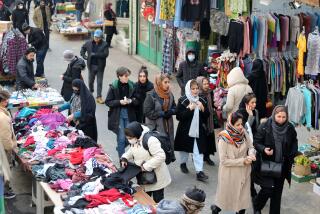Iran Pulls Funds From Europe, Seeks Oil Cutbacks
- Share via
TEHRAN — Iran announced Friday that it had begun pulling its foreign currency accounts out of European banks to protect its assets from possible U.N. sanctions over its nuclear program.
Analysts estimated that the amount could be as high as $50 billion, though no actual figure was announced.
Iran also called for a reduction in OPEC oil production, raising the possibility that Tehran would use oil in its standoff with the West. Iran pumps about 4 million barrels of oil a day, making it the second-largest producer in the Organization of the Petroleum Exporting Countries, after Saudi Arabia.
Iran’s hard-line president, Mahmoud Ahmadinejad, met Friday in Damascus, Syria, with leaders from the Palestinian militant groups Hamas and Islamic Jihad.
The meeting came a day after an Islamic Jihad suicide bomber blew himself up at a Tel Aviv restaurant, wounding 20 people. Israel accused Iran and Syria of being behind the attack, a charge both countries denied.
The currency withdrawal signaled that Iran was willing to weather United Nations punishment rather than abandon its nuclear ambitions. The United States and some in Europe say Iran wants to develop atomic weapons. Tehran insists its program is for generating electricity.
Friday’s move also deprives Europe of an important lever to influence Iran.
Iran’s Oil Ministry confirmed Friday that the country was pushing for OPEC to cut its overall production.
Ministry spokeswoman Souzan Shakourzadeh said the move was linked to the expected fall in demand for oil in the second quarter of 2006 and not to the nuclear dispute.
The announcement of the withdrawal of Iran’s foreign currency accounts from Europe came from the country’s central bank governor, Ebrahim Sheibani.
“We transfer the foreign exchange reserves to wherever we deem fit,” Sheibani was quoted as saying by the semiofficial Iranian Students News Agency. He would not say how much money was involved or where Iran would move it.
Iran’s assets in the United States were frozen shortly after the 1979 revolution that toppled the pro-Western Shah Mohammed Reza Pahlavi and installed a clerical regime.
More to Read
Sign up for Essential California
The most important California stories and recommendations in your inbox every morning.
You may occasionally receive promotional content from the Los Angeles Times.










